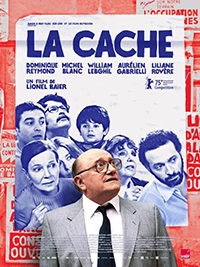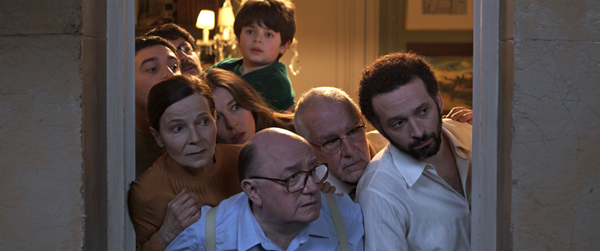May Days: Baier’s Broad Commentary on a Revolutionary Footnote
 “Great minds discuss ideas; average minds discuss events; small minds discuss people,” said Eleanor Roosevelt. Dipping its irreverent toes into each of these camps is The Safe House, the latest film from Swiss director Lionel Baier, adapted from the novel by Christophe Boltanski. And Baier most assuredly wants the audience to recognize the origins of the source material, with narration often breaking the fourth wall to remind us we are watching the reenactment of a publication, arguably docu-fiction, which presents a curious event which transpired at the home of a quirky artistic family during the civil unrest of May, 1968. And by being a narrative which flirts with ideas surrounding a major event catalyzing the appearance of a highly contentious person at the center of the upheaval, Baier’s offering only succeeds as a pleasant, self-aware crowd pleaser which makes the most of its slight intentions.
“Great minds discuss ideas; average minds discuss events; small minds discuss people,” said Eleanor Roosevelt. Dipping its irreverent toes into each of these camps is The Safe House, the latest film from Swiss director Lionel Baier, adapted from the novel by Christophe Boltanski. And Baier most assuredly wants the audience to recognize the origins of the source material, with narration often breaking the fourth wall to remind us we are watching the reenactment of a publication, arguably docu-fiction, which presents a curious event which transpired at the home of a quirky artistic family during the civil unrest of May, 1968. And by being a narrative which flirts with ideas surrounding a major event catalyzing the appearance of a highly contentious person at the center of the upheaval, Baier’s offering only succeeds as a pleasant, self-aware crowd pleaser which makes the most of its slight intentions.
A nine-year-old boy (Ethan Chimienti) is convinced a cat is living beneath the floorboards, something his grandfather (Michel Blanc) confirms is impossible. But the rest of the extended family living in their Parisian family home gamely entertain the boy, confirming his belief a cat exists beneath them, like Schrödinger’s cat, is either there, not there, or both. As the child ponders this, Baier’s voice interjects to confirm this child would be the one to eventually publish the novel depicting the narrative we’re about to experience. Besides grandpa, a doctor who runs his own practice, there is his grandma (Dominique Reymond), who drives around Paris interviewing ‘invisible’ people about their lives. The child is often left with his grandparents as his own parents (Adrien Barazzone, Larisa Faber) are running around the city in solidarity with the student uprising. And so he spends much of his time with his great-grandmother (Liliane Rovere) and his two uncles (William Lebghil, Aurelien Gabrielli), the younger of whom has just had his first art exhibition. As the city descends into chaos around them, a surprise visit inspires a formative reflection for the family.

Dedicated to the memory of Michel Blanc in his penultimate performance, The Safe House’s greatest assets happen to be its seasoned cast members. Particularly Dominique Reymond as a fiercely individualistic grandmother who rises above the film’s tritely contained parameters as a character of unique interests. While Liliane Rovere entertains as the crotchety matriarch who continually reminisces about youthful romance and rubbing shoulders with early century Russian composers as a noted ballet dancer in Odessa, she’s perhaps the clearest example on how Baier presents this kooky clan as representative ideas rather than fully formed characters. As such, this pseudo Capra-esque clan of creatives tends to irritate, while underselling Aurelien Gabrielli, portraying the artist who would eventually be known as Christian Boltanski.
Baier is clearly playing with reenactment, revealing the purposefully artificial set pieces and studio trappings as Reymond toggles around Paris, not unlike Mona Achache’s approach in paying homage to her mother in the much more textured Little Girl Blue (2023). The film’s final moments utilize a famous scene from Godard’s comic 1967 film Weekend, which suggests the tone Baier is attempting. Eventually, this gets a bit tiresome until the surprise visit from Charles De Gaulle, the grand revelation of the narrative, ironically utilizing the same hideout where grandpa hid from the Nazis, who listened to radio broadcasts from De Gaulle to keep hope intact.
There are several profound moments in the third act, but Baier’s playful approach tends to diminish what he’s most interested in exploring, namely reflecting a version of ‘truth’ from a source he’s far removed from. De Gaulle’s odd flight for respite aside, The Safe House doesn’t quite convey just how tumultuous May, 1968 was.
Reviewed on February 20th at the 2025 Berlin International Film Festival (75th edition) – Main Competition. 90 mins
★★/☆☆☆☆☆


